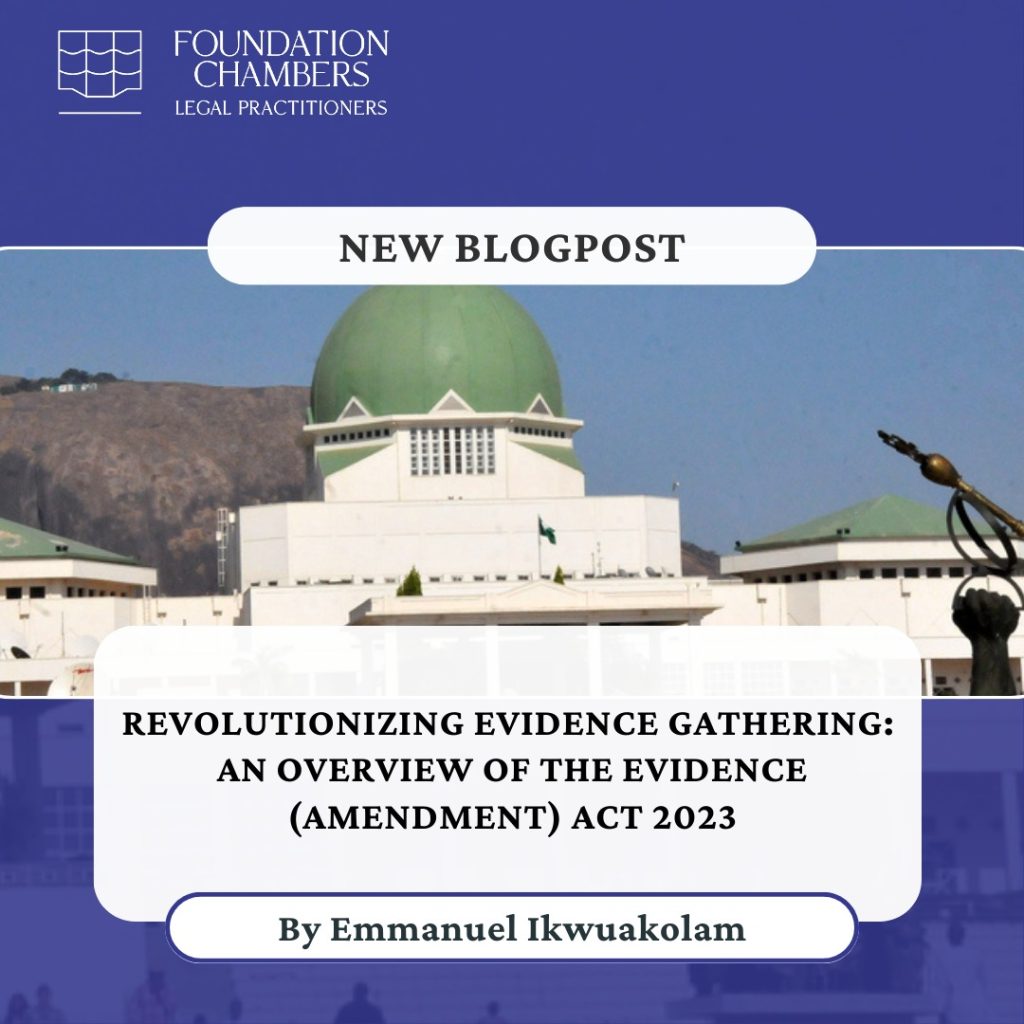On the 12th of June 2023, President Bola Ahmed Tinubu signed, the Evidence (Amendment) Act 2023 (‘the Act’) into law. This amendment ushers in radical changes to the practice and procedure of evidence taking in Nigerian courts.
The Act does not repeal the Evidence Act, 2011(the ‘Principal Act’). It, however, amended certain provisions of the Principal Act to bring them in conformity with global technological advancements in the practice and procedure of evidence taking. This article therefore seeks to examine the notable changes introduced by the Act and its significance to the Nigerian judicial system.
Overview of the Notable Provisions of the Act:
The Act has 11 sections, with its long title stated as ‘An Act to amend the Evidence Act, No.18, 2011, to bring its provisions in accordance with global technological advancements in evidence taking which shall be applicable to all judicial proceedings in or before courts in Nigeria; and for related matters’’. Some notable provisions of the Act are examined hereunder:
Introduction of Digital Signature and Electronic Authentication techniques
The Act introduces the utilization of digital and electronic signatures within court documents and other legal processes. According to section 10 of the Act, a digital signature is defined as “an electronically generated signature attached to an electronically transmitted document to verify its content and the sender’s identity.” On the other hand, an electronic signature is defined as “the authentication of any electronic record by a subscriber using the electronic technique specified in the Second Schedule, which also encompasses digital signatures.”
Section 3(1) of the Act incorporates the usage of these signature forms by inserting a new section 84A-D immediately after section 84 of the Principal Act. Notably, the amended provision, section 84C(1), now empowers any individual to authenticate an electronic record by affixing their digital signature to it. Furthermore, the Act establishes specific provisions to uphold the integrity of digital signatures. It mandates that such digital signatures or other electronic authentication methods must be reliable and fulfill the conditions specified in the Statute.[1]
Expansion of the Scope of Computer-Generated Evidence:
The Act broadens the range of computer-generated evidence as outlined in section 84 of the Principal Act. This extension is facilitated by section 2 of the Act, which revises section 84 of the Principal Act by seamlessly adding the phrase “or electronic records” right after the term “document”. As a result, along with conventional documents, electronic records (as defined within the Act) are now permissible as evidence, granted they adhere to the stipulated conditions set forth by the Act.
Introduction of Electronic Oath Taking
According to the Act, it is now possible to electronically submit Affidavits and other documents that involve oath-taking, including witnesses’ written statements given under oath. This change is brought about by Section 5 of the Act, which replaces Section 108 of the Principal Act with a new version. This updated section, namely Section 108, introduces an additional subsection that specifies that when an affidavit is electronically sworn before an authorized individual, a copy of it can be filed in court and subsequently accepted for any legal purpose within the court proceedings.
Recognition of Electronic Gazette
The Act also acknowledges the concept of an “Electronic Gazette” as a valid method for the publication of rules, notifications, or other relevant matters. This provision is established through section 9 of the Act, wherein it replaces section 255 of the Principal Act with an updated version encompassing an extra subsection, subsection 2. This new subsection clarifies that if a legal provision mandates the publication of a rule, notification, or any similar matter in the Federal Government Gazette, this obligation will be considered fulfilled if the publication is carried out in either the Federal Government Gazette or the Electronic Gazette.
Incorporation of Additional Terms in The Interpretation Section of the Principal Act
The Act also amends the Principal Act by inserting definitions for audio visual communications, cloud computing, computer, digital signature, electronic gazette, electronic record, electronic signature, magnetic media and optical media.[2]
Conclusion
There is no doubt that the modifications brought about by the Act are poised to establish a fresh framework in the way evidence is gathered in Nigerian Courts. These alterations carry significant consequences for not only lawyers and litigants but also for judicial officers. Consequently, it becomes crucial for these parties to stay well-informed about these legal advancements. The expectation is that these revised regulations will soon contribute to the improvement of efficiency within the Nigerian judicial system.
[1] See Section 84D, Evidence Act 2011, As amended by s.3(1) Evidence Act (Amendment)Act 2023
[2] Evidence Act (Amendment)Act 2023, s.11.


